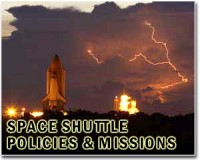 |
Cape Canaveral, Florida (AFP) Nov 5, 2010 A hydrogen leak forced NASA to announce its fifth delay Friday to the space shuttle Discovery's final mission to the International Space Station, this time until the end of November. A seven-inch (18 centimeter) long crack was found on the external fuel tank of the shuttle just hours before it was to launch, prompting the latest setback for the troubled mission after a spate of bad weather and electrical glitches. The Discovery launch, now set for November 30, aims to be the fourth and final shuttle flight of the year and the last scheduled for Discovery, the oldest in the three-shuttle fleet that is being retired next year. Even though astronauts and NASA engineers endured a frustrating week of delays, shuttle launch director Mike Leinbach said the team agreed on the decision to postpone. "We all know in our hearts the right thing to do is take this slowly," said Leinbach. "We will come back Monday and hit it hard and go fix this problem." The leak, which Leinbach described as "significant," was found about two hours after operations began to fill the external fuel tanks with liquid hydrogen ahead of the launch. Escaping hydrogen and ice were detected at "an attachment point between the external tank and a 17-inch (43 centimeter) pipe that carries gaseous hydrogen safely away from Discovery to the flare stack, where it is burned off," the NASA website said. The hole was traced to a seven-inch long crack on the tank foam which allowed ice to form, according to the head of the mission management team Mike Moses. "I don't know if that would have passed our criteria to be 'go' for the launch but it would have generated a lot of discussion," Moses said. NASA set the next launch attempt for no earlier than November 30 at 4:05 am EST (0905 GMT), but said that could change slightly as the date approaches. "Our launch schedule is not really our launch schedule, it is more our work schedule," said Moses. "And if we need a couple more days it is easy to do." NASA had previously set the next launch window from December 1 to December 5. Heavy rain scrubbed Thursday's launch of Discovery, after electrical glitches that postponed the launch three times earlier in the week were resolved. Discovery's 11-day mission with its all-American crew of six will deliver a pressurized logistics module called Leonardo, which will be permanently attached to the space station to provide more storage space. The shuttle will also bring Robonaut 2, the first human-like robot in space and a permanent addition to the orbiting space station, as well as spare parts. Two space walks, for maintenance work and component installation, are scheduled. The Discovery has launched into space 38 times, and NASA aims to retire the shuttle after this, its 39th voyage. The final official shuttle mission for the entire program is scheduled for Endeavour on February 27, 2011. However NASA's budget allows for one more shuttle flight which, if funding allows, may take place in June 2011. The US space program launched its first shuttle on April 12, 1981. Two of its five shuttles have disintegrated in mid-air explosions: Challenger in 1986 shortly after liftoff and Columbia in 2003 as it attempted to return to Earth.
Share This Article With Planet Earth
Related Links Shuttle at NASA Watch NASA TV via Space.TV Space Shuttle News at Space-Travel.Com
 Shuttle Discovery launch delayed to Friday
Shuttle Discovery launch delayed to FridayCape Canaveral, Florida (AFP) Nov 4, 2010 The final scheduled launch of the space shuttle Discovery before being mothballed in a museum was delayed for a fourth time Thursday due to bad weather, the latest in a series of delays for orbiter's mission to the International Space Station. Heavy rain early Thursday buffeted Florida's Kennedy Space Center where Discovery had already been rolled out to the launchpad after early glitches th ... read more |
|
| The content herein, unless otherwise known to be public domain, are Copyright 1995-2010 - SpaceDaily. AFP and UPI Wire Stories are copyright Agence France-Presse and United Press International. ESA Portal Reports are copyright European Space Agency. All NASA sourced material is public domain. Additional copyrights may apply in whole or part to other bona fide parties. Advertising does not imply endorsement,agreement or approval of any opinions, statements or information provided by SpaceDaily on any Web page published or hosted by SpaceDaily. Privacy Statement |